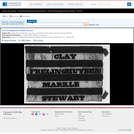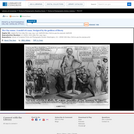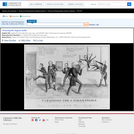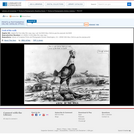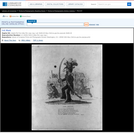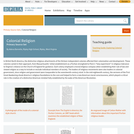The artist lionizes Kentucky senator Henry Clay, author of the Compromise of 1850, and slams his political foes and critics of the compromise, particularly those in the Taylor administration. A text in the lower margin reads: "A Fable--In the Reign of Zackery 1st the Goddess of Liberty Designed a Statue. a Model of a Man which she exhibited before the King, his Ministers, & the People. the Beauty of the Statue Elicited such shouts of Approbation from the People that the King's Ministers fired with Jealousy determined to Destroy it, but after many Ineffectual attempts were obliged to Desist amidst the Laughter of the Court & the People." The King is clearly President Taylor, who sits on a throne at the far left, in uniform and holding a sword instead of a scepter. A spittoon is on the floor before him, and a black court jester crouches beside the throne holding a copy of the newspaper the "Republic." A larger-than-life statue of Henry Clay, in armor and holding a shield inscribed "Compromise" and a sword, stands in the center of the scene. Clay's sword bears the words, "I fight for my Country! Traitors Beware." The statue towers over the figures that surround it, which include Taylor cabinet members Reverdy Johnson, George W. Crawford, and Thomas Ewing (on the right) and Secretary of State John M. Clayton (on the left). Crawford and Ewing regard the broken ax and saw which they hold in their hands. Crawford (to Johnson): "Look here Just see what a great Big Piece Ive Broke of my Gulpin Ax. I'll send in a Gulpin Claim for this. Valuable Ax this." The allusion is to Crawford's lucrative and questionable role as counsel for the Galphin family's successful suit against the federal government, an arrangement which provoked heated criticism in the press. The controversy over this Taylor administration scandal reached its peak in April, May and June of 1850. Johnson: "The Ax, was Broke before you used it, however, you Lie & I'll Swear to it, & we'll Pockett the Plunder between us." Ewing: "Why Ive Broke nearly all the teeth of my Chickensaw against this Infernall Statue. I'le send in a Big Claim for this." Clayton gestures entreatingly to Taylor: "Why the Devil dont your Imperial Majesty assist us, I can assure your Majesty, it's much Easier discharging a Bullitt, from a Republic, than it is injuring this Statue." Journalist Alexander C. Bullitt was a Taylor advisor and, beginning in 1849, editor of the administration organ the Washington "Republic." Bullitt appears here as the black court fool. Taylor hugs to his chest the tiny figure of New York senator William H. Seward, who sits on his lap. Seward was an insider in the short-lived Taylor administration, and a vigorous opponent of the Compromise of 1850. Taylor says, "Consider the weight of my Crown, Dear Clayton. besides my sick Baby, little Billey, requires, all my Care. moreove as the People like the Statue, I'de rather not Compromise myself, in the matter. assume the Responsibility Yourself, you'r used to it." Just to the right of the throne stand (left to right) senators Thomas Hart Benton, Daniel Webster, and Henry S. Foote. Benton: "Why its a Miserable Statue. a wretched abortion, the inscriptions on the Sword & Shield are in very Bad Taste, very Bad Taste indeed." Benton was an adamant critic of the Compromise. Foote (to Webster): "I think its a Splendid Statue. Which Party do you go for." Webster: "The Party thats likely to win. Of Course, I shall Keep one eye on the Statue, & the other on the Chair, & act according to circumstances." Senator Lewis Cass stands to the right of Foote, in the background, saying, "I rather like the Inscription on the Shield." Clay does, however, have some friends here. On the far right is a crowd of people led by the figure of Liberty, a young maiden in a classical gown holding a staff and liberty cap. She addresses Johnson and the others, "Gentlemen! I made this Statue as a Model of a Man. now though it is only of Clay & I wafted it here in a Breath, still with all your efforts, you can neither move it from its Base, or inflict the slightest Injury upon it. its innate strenght [sic] will defy all your Puny attempts." Liberty's followers enjoin, "Why I think it's a Beautifull Statue," and "So do I! Hurrah! for the Clay Statue." "The Clay Statue," though tentatively dated 1849 by Weitenkampf, must have appeared in 1850, certainly after Henry Clay's presentation of the compromise in January and probably as late as the spring, at the height of the Galphin controversy.|Drawn by John L. Magee.|Pubd. by John L. Magee 34 Mott St. N.Y.|Title appears as it is written on the item.|Weitenkampf, p. 98.|Forms part of: American cartoon print filing series (Library of Congress)|Published in: American political prints, 1766-1876 / Bernard F. Reilly. Boston : G.K. Hall, 1991, entry 1850-9.
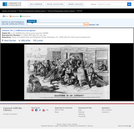
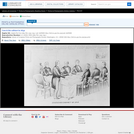
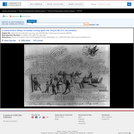
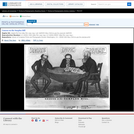
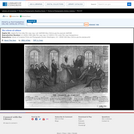
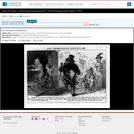
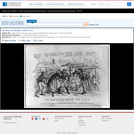
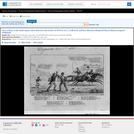
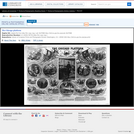
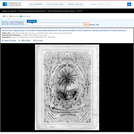
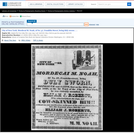
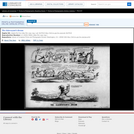
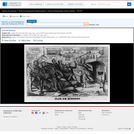
![[Clay-Frelinghuysen Campaign Badge]](https://img.oercommons.org/160x134/oercommons/media/upload/materials/screenshots/materials-course-76039.png)
